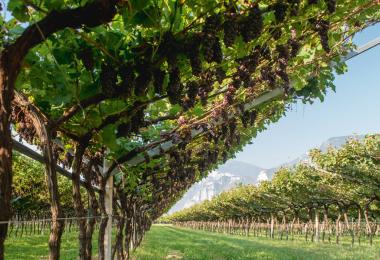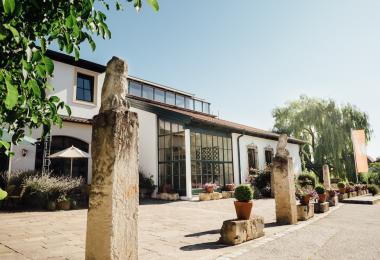“Several vineyards have called us to ask if we have any labour available” says Jérôme Barret, head winemaker at Mark Dixon’s MDCV wine company, which owns the largest wine estate in Britain. Before the first post-Brexit harvest, big producers like MDCV - owners of Kingscote and Seddlescombe - Nyetimber and Gusbourne secured skilled EU labour, but smaller producers are facing the prospect of not having enough pickers. Several producers and prominent winemaker Dermot Sugrue of Wiston Estate and Sugrue Downs, estimate that labour supply in British vineyards post-Brexit has fallen to less than a third of required levels.
Will grapes be left on the vines this harvest, as strawberries, lettuces and flowers were in UK fields earlier this year because of a lack of harvesters?
Anticipated low yields could temporarily soften the blow of labour shortages. Several producers in Southern England have reported severe cases of downy mildew, which ravaged vineyards in August following heavy rainfall in June and July. These issues are in addition to the impact of a cold spring that brought frost damage and led to a late harvest. Everything now depends on the weather up until mid-October, when picking is expected to start.
Producers may also have to spread the harvest over more days, which some fear could cause logistics problems and increased transport costs, and impact ability to pick at optimal times. Labour suppliers blame the shortage on Brexit’s end of freedom of movement for EU citizens, which has prompted European workers who were based in Britain, to move elsewhere, or for those living on the mainland not to apply for seasonal work in the UK. The pandemic has, of course, exacerbated the situation, with producers unable to hire interns from around the world.
Darcy Gander, Director of Vine-Works Ltd, a leading provider of viticulture and labour services to British vineyards, says his pool of EU skilled labourers, mostly Romanians, has diminished by 50%. He blames the situation on the limitations of Britain’s settled status scheme.

Dermot Sugrue, award winning winemaker at Sugrue South Downs and Wiston Estate has had difficulties importing material and exporting to Ireland / Credit: Barnaby Eales
Mike Wagstaff, owner of Greyfriars vineyard in Surrey, says that EU seasonal workers have been put off by the expense of visas, which cost £244, and which are limited to six months in duration. Prior to Brexit, EU labour has been used beyond harvest throughout the growing season.
During the summer, seasonal Romanian vineyard workers were turned back at the UK border, with officials officials unsure of new Brexit seasonal labour legislation. The British government has allocated an insufficient number of seasonal worker visas, say the recruitment companies.
In response, the UK government has called on producers to use its domestic workforce. Hattingley Valley Chairman, Simon Robinson, says that “very committed volunteers are compensated for their work”, rather than being paid. Some might question whether payment in kind is a sustainable long term strategy for a wine producer.
Mark Driver, at Rathfinny estate in Sussex, says he’s never used EU pickers, but recruited and trained locals instead, who become ambassadors for their brand. However, David McNally, owner of Hidden Spring vineyard in Sussex, who is employing domestic pickers this year, says they are generally less experienced and slower than their EU counterparts. He reckons his labour costs will increase by between “50 and 100%.”
Automation risk
Kristin Sylvetik, producer and owner of the Oxney organic wine estate in Sussex, says she will machine harvest Seyval Blanc grapes which, unlike other grape varieties such as Chardonnay, have been unaffected by mildew. Another big winery, Chapel Down is doing trials on machine-harvesting, and MDCV could machine harvest next year.
However, whole-bunch grape picking for traditional method sparkling wine is done by hand. “Brexit means English wine will lose its typicity, if machine-harvesting is used,” says one winemaker, who points out that it would have an impact on production quality.

Gusbourne, which aims to become a global luxury brand, has established an EU hub in Belgium
Domestic sales leap: could prices rise?
The rise of domestic sales has softened the impact of Brexit and Covid on producer costs and their ability to export, producers say. Hattingley Valley, which produces 650,000 bottles of wine a year, has reported that its direct-to-consumer sales have increased from £15,000 ($20,500) to over £500,000 ($685,000) since April 2020.
David McNally, owner of Hidden Spring vineyard, says he has had the busiest sales period ever over the past two years.
Mardi Roberts, communications director at Ridgeview, says the company diverted the loss of on-trade sales caused by the pandemic to record direct-to-consumer and off-trade business. ‘Staycations’ – holidays taken by Britons in Britain - have led to a surge in visitors to wineries. Online sales have also had record growth.
However, Douglas Jacobsohn, owner of the Busi-Jacobsohn wine estate, fears lower production resulting from a lack of labour supply means consumers will end up paying higher prices. If so, could this threaten the rise of the domestic direct-to-consumer sales, which have risen partly thanks to a growing thirst for local wines?
Dynamic market
The production of quality sparkling wines in Britain has spurred on a spectacular surge in vine plantings, to about 3,800 hectares in 2021. A total of 1.8m vines planted three years ago are expected to come into production this year. Despite Brexit and the pandemic, wealthy producers like Taittinger and MDCV, are continuing to invest in the English wine industry.
Justin Howard-Sneyd MW, a consultant and wine producer, says there is currently no oversupply of production. Sales are in line with production. However, he fears that oversupply could become an issue in the future. In a good vintage, he says, Britain has the capacity to make 20 million bottles – a production figure close to Britain’s annual consumption of Champagne.
This week, MDCV launched its new premium Charmat method, sparkling Harlot wines, reflecting the dynamic nature of English wine production.
In contrast to Hattingley Valley’s ‘Unapologetically British’ marketing slogan, MDCV says Harlot wines, aimed at a younger demographic, are ‘unapologetically different.’ MDCV has produced 200,000 bottles of Harlot, which are intended to sell at £15 ($20.50) and £16 ($21.90) a bottle. It will produce wine in cans, and is doing wine-on-tap keg trials at pubs.
If Prosecco-style English Charmat production is increasing in a country which consumes about 80 million bottles of Prosecco a year, so too is still wine production, a move which Howard-Sneyd says can only be welcomed, considering that these two styles of wine have a bigger market potential in Britain than traditional method sparkling wine.
However, questions are being asked whether British consumers who generally pay £6-7 ($8.20-$9.60) for Prosecco, will be ready to pay twice that price for a wine produced by the same method in the UK. Other observers also wonder more fundamentally whether the introduction of Charmat might have a negative effect on the reputation of a young industry that routinely uses comparisons with Champagne to justify retail prices of £20-30 ($27.35-$41).

New Sparkling Harlot premium Charmat method wines produced by MDCV, which aims to become the biggest English wine producer.
By 2025 it wants to make 5 million bottles of English wine / Credit: Barnaby Eales
Setting up in the EU
Wine GB, the trade association for English and Welsh wine, says prices for consumers of exported English wine to the EU (once all operator margins are accounted for) have increased by between £5.76 and £9.73 per bottle in a retail environment, and between £9.82 and £14.60 per bottle in a restaurant environment, since January 1st 2021.
The post-Brexit transport cost rises are based on examples of a pallet going from the UK to the Netherlands, that have dramatically leapt from £150-£180 in 2020 to £600-£650 today.
Other increased costs have been caused by imports – and delays - of production equipment and material from the EU, mainly from France and Italy.
For English wine producers, difficulties trading with the EU post-Brexit have also complicated exports to non-EU destinations, because wines are either transited across the EU or, in the case for markets like Taiwan and Japan, sent via export hubs inside the EU.
This partly explains why Gusbourne, a producer focused on high-end traditional method English sparkling wines, has just established a hub in Belgium. "Brexit has accelerated this, but it is largely a logistical solution to our global expansion” said Charlie Holland, Gusbourne’s CEO and head winemaker.
Key figures: English and Welsh Wine
Sales in 2020: up 30% to 7 million bottles
Production in 2020: 8.7 million bottles
Vineyard area: 70% increase over 5 years to 3,800 ha in 2021.
Current Potential production: 20 million bottles
Barnaby Eales








